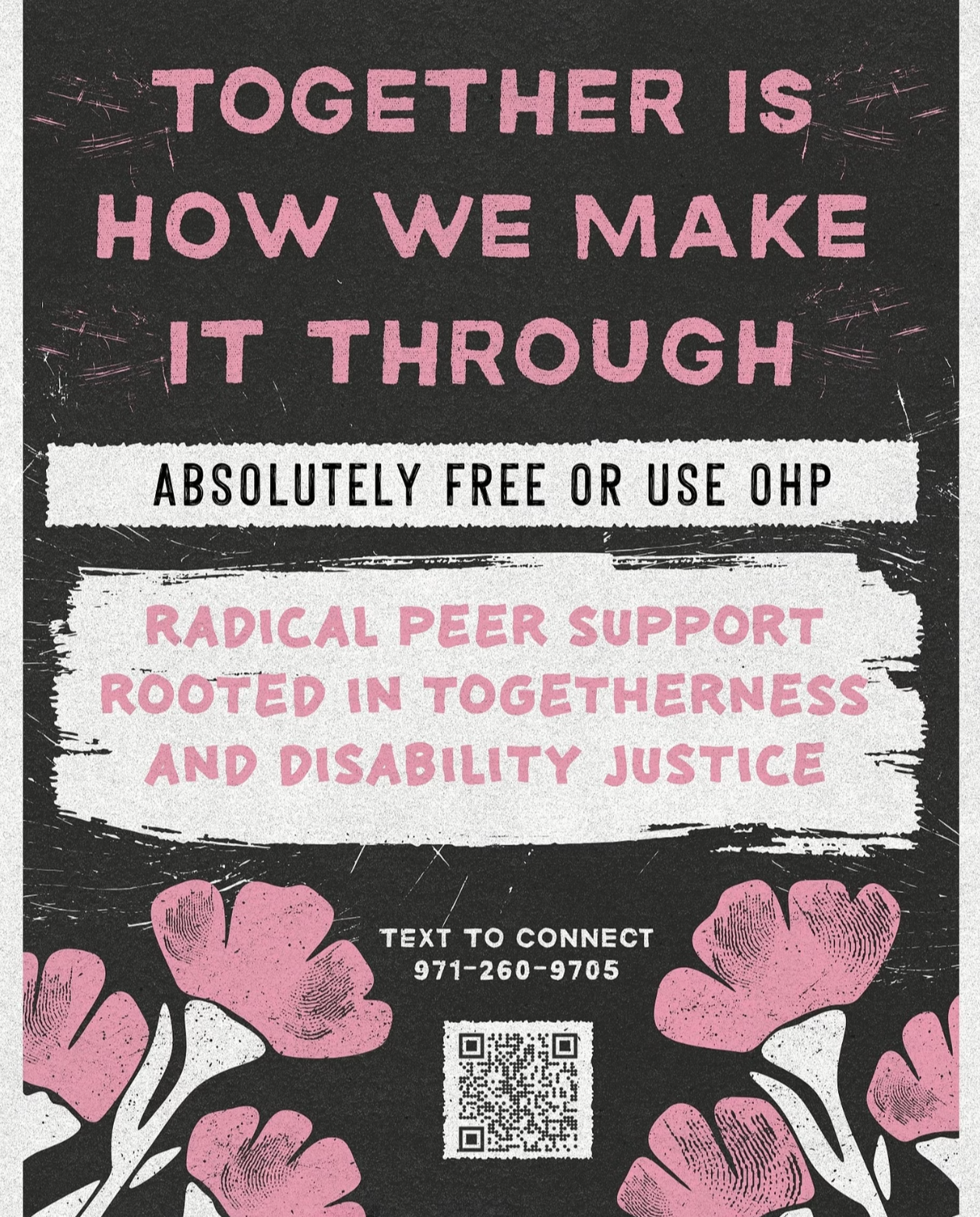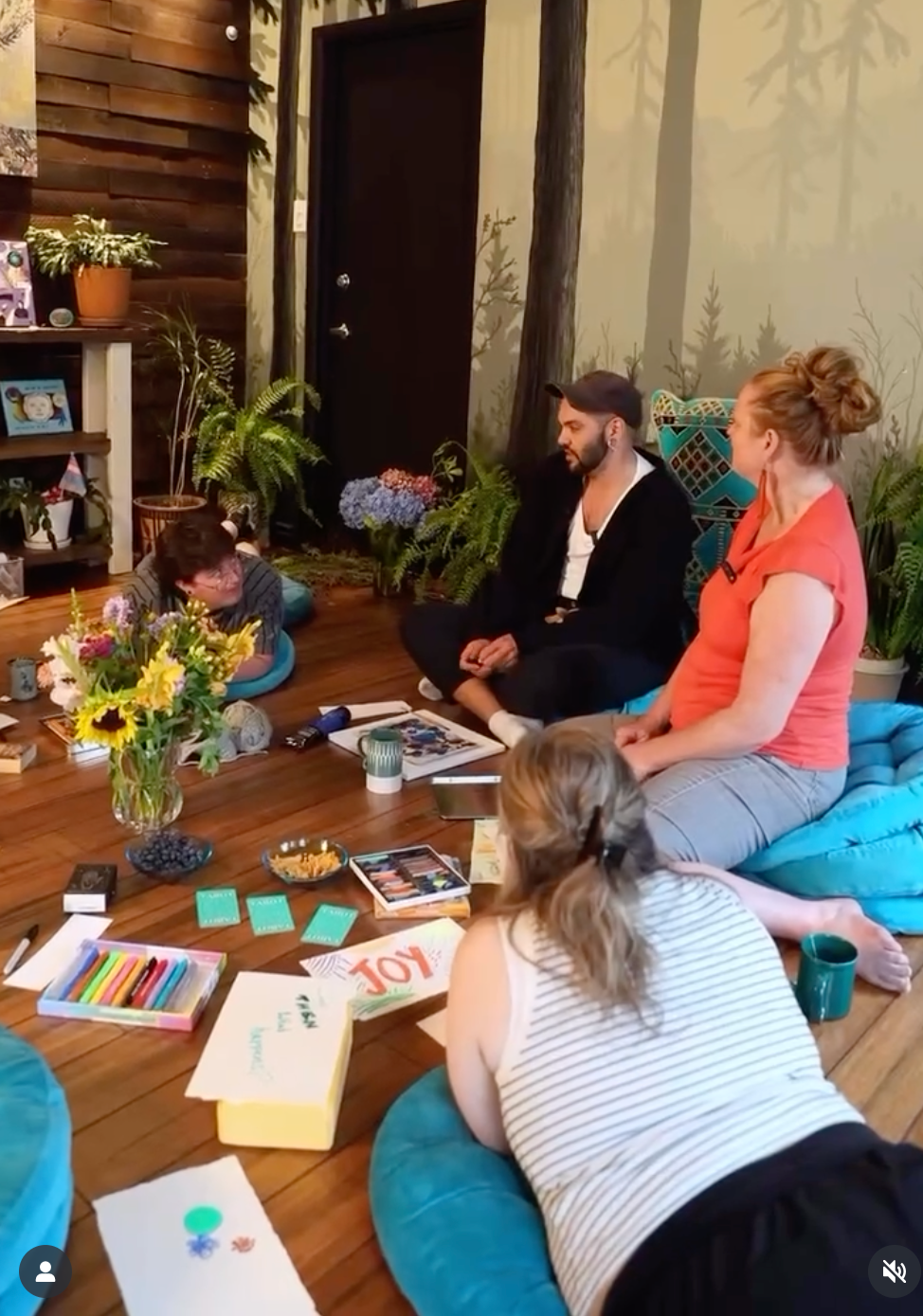Thanks for considering referring your clients to our Peer Support program!
What Is Peer Support?
Peer Support is care through connection. It’s relational & practical life support from people who’ve been there, people who live with mental health challenges, chronic or invisible illness, trauma, disability, or systemic oppression — and who are trained to walk alongside others with compassion and care.
At TendWell, our Peer Support is not clinical or diagnostic — it’s human to human. It’s an additional layer of support, not a replacement for therapy, case management, or medical care. Many of our clients are already working with therapists, prescribers, or other providers. Peer support works best as part of a circle of care — offering grounding, companionship, and steady presence between appointments.
How Does Peer Support Work?
Folks wanting peer support can book 1:1 sessions for free through September 30th, and have it covered after that by OHP, no copays
They’re matched with a Peer Support Specialist who shares relevant lived experience
Sessions are client-led, relational, and flexible — available online or in person
Peers offer emotional, practical, and presence-based support at the client’s pace
What Makes TeamWorks Peer Support Unique?
Unlike most peer support programs that center addiction recovery or simply connecting people to services, our peer program is specifically by and for queer folks, disabled or neurodivergent folks, those living with invisible or chronic illness, and people who are survivors of systems that misunderstood or harmed us. We show up as people walking alongside our clients — offering presence, tools, and solidarity.
Lived experience at the center: Peers bring real-world understanding, not just training
Presence without pressure: No “fixing,” goals, or checklists required to receive support
Culturally relevant and identity-affirming
Rooted in dignity and consent — we follow, we don’t push
OHP-covered and accessible to anyone for free, regardless of insurance
What Does Peer Support Look Like?
Below are real ways Peer Support can show up in someone’s life. Clients are welcome to name what they want help with — or explore together what’s possible.
-
Talking thru grief, trauma, illness, or identity with someone who gets it
Exploring queerness, neurodivergence, spirituality, or big life transitions
Sharing space after hard therapy sessions, diagnoses, or emotional overwhelm
Unpacking harm from systems (medical, psychiatric, school, etc.)
Exploring boundaries, consent, self-trust, and safety
Sitting with crisis or pain without needing to “fix” it
Dreaming together about what healing and belonging could look like
-
Learn how to use Trimet (bus, MAX, paratransit)
Ride along to new or overstimulating places
Practice using maps, schedules, or apps
Explore how to get reduced fare passes
Try entering new spaces (grocery stores, events) with support
Rebuild confidence and ease around being in public spaces
-
Visit places together: parks, libraries, thrift stores, cultural events
Attend LGBTQIA+ events, recovery spaces, or disability-justice meetups
Go to free community classes or workshops
Explore community resources like food pantries, clothing closets, free fridges, and resource fairs
Practice entering spaces that feel safe and identity-affirming, like: LGBTQIA+ events, Recovery-friendly meetups, Disability justice or chronic illness groups, Free or low-cost community classes or workshops.
-
Break down tasks into small, doable steps
Sit with you while making phone calls, sending emails, or filling out forms
Help you with a resume or cover letter, or help you dream into a career change
Practice scheduling, planning, and setting up weekly rhythms
Explore budgeting basics, meal planning, or stretching SNAP/EBT benefits
Build back executive functioning after overwhelm or burnout
-
Collage, watercolor, or journal together
Try zine-making, visual storytelling, beading, or knitting
Listen to music or attend open mic/art nights and reflect together
Make grounding kits, visual schedules, or care plans
Use creative expression to process emotions or reconnect to joy
-
Ride along to doctor, housing, or benefits appointments
Make lists of questions or practice how to advocate for yourself
Call agencies together or sit with you while you call
Talk through your rights, options, or disclosure concerns
Unpack and complete hard paperwork like OHP, SSI, or SNAP
Map out possible next steps, without pressure to decide right away
What Peer Support Does NOT Do
To stay within our role and protect the integrity of our relationships, Peer Support does not:
Give legal advice or represent people in court
Diagnose, offer medical advice, or make treatment decisions
Write official letters for legal, disability, or custody matters
Act as therapists or prescribers (though we are mandatory reporters)
Enter into personal or social relationships with clients
Make decisions for you — we only make choices with you
HOW TO REFER •
HOW TO REFER •
We’d love to walk alongside the people you serve — and to be part of the healing ecosystems you're already building.
>> Fill out a client referral form HERE (or fax us @503-664-7502)
>> Clients can text us to learn more and book a session: 971-260-9705
>> Email us with questions or referrals: hello@tendwellnonprofit.org



